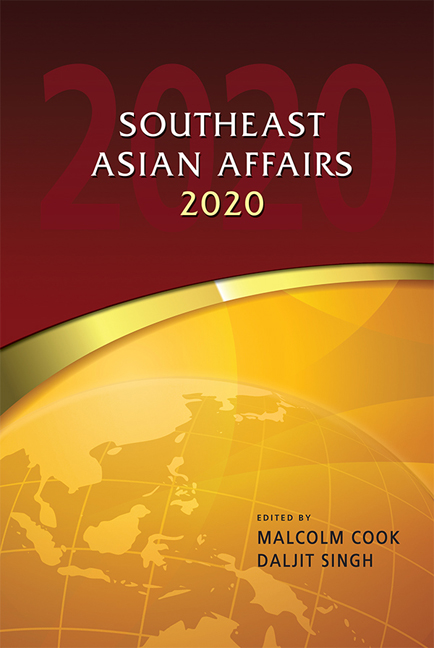Introduction
Published online by Cambridge University Press: 24 November 2020
Summary
The twenty-two chapters in Southeast Asian Affairs 2020 again highlight the dynamism and diversity of the eleven countries covered and Southeast Asia as a region. Events ranged from the tragic deaths from overwork and poor conditions of many election workers in Indonesia during the national elections to the release on social media of a rap song supporting former Malaysian prime minister Najib Razak, the first leader of UMNO to lose a parliamentary election.
Six overarching themes each feature in many of the twenty-two chapters, and no chapter is devoid of all six. Two of these themes are global in nature, two relate to major powers outside of Southeast Asia, and two are domestic in nature. The enduring and definitive nature of these themes is underlined by the fact that many of them feature heavily in previous volumes of Southeast Asian Affairs, including those like major power competition and transitions in political leadership that have been constant themes since the first volume was published almost a half century ago. Others, like environmental degradation and the political ramifications of social media, are distinctly modern.
Environmental Degradation
In the thematic chapter for Malaysia, Serina Rahman looks at the ambitious environmental policy agenda of the Pakatan Harapan government and the political challenges it faces. Global pressure particularly from the European Union on the Malaysian palm oil industry, a major source of Malaysian exports, has led to a defensive response from Kuala Lumpur in contrast to the proactive position the government has taken against the export of trash to Malaysia from advanced Western economies. The Pakatan Harapan government has taken a regional lead in trying to address some of the causes and consequences of environmental degradation. Will others follow?
Social Media Politics
The thematic chapter for Indonesia by Jennifer Yang Hui looks at the use and influence of social media in the 2019 elections in the largest country of Southeast Asia. In Indonesia, social media is now the predominant channel of political communication between politicians and voters and supporters of politicians and voters. A large industry of social media political communication has arisen that is changing the conduct of election campaigns fundamentally. In the 2014 and 2019 presidential campaigns, black propaganda against political opponents has proven to be widespread even if its effectiveness is questionable.
- Type
- Chapter
- Information
- Southeast Asian Affairs 2020 , pp. vii - xPublisher: ISEAS–Yusof Ishak InstitutePrint publication year: 2020



